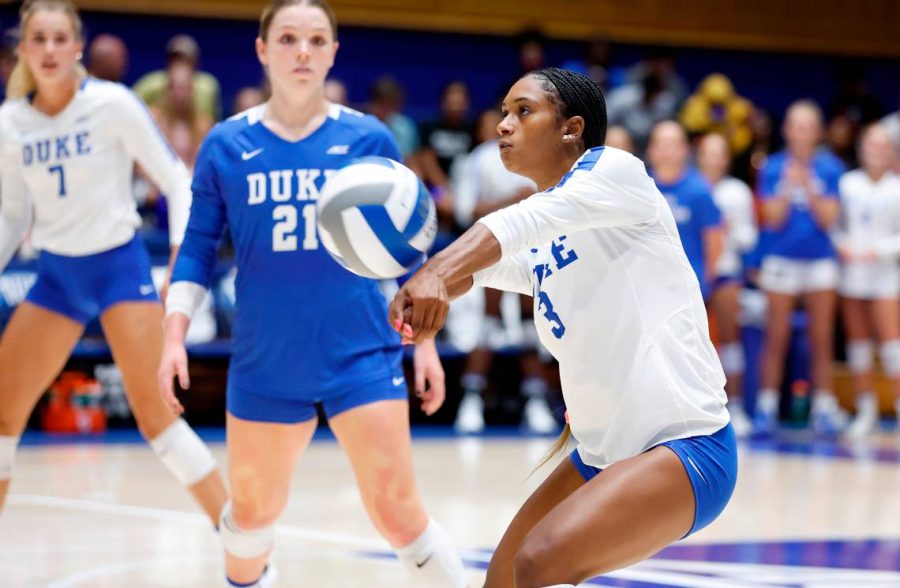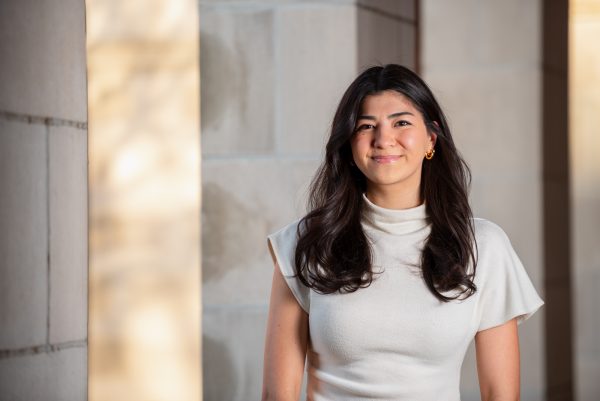BYU incident reflects racism in college athletics
The race-based heckling of a Duke volleyball player in August raises serious questions for college sports
Courtesy of the Raleigh News and Observer
Rachel Richardson (right), who says racial slurs were yelled at her during a volleyball match, sets a ball.
September 28, 2022
Racism within the sporting world runs deep— historically, but also today.
During a women’s volleyball game at Brigham Young University on Aug. 26, Rachel Richardson, the only Black starter for Duke’s women’s team, and her “fellow African American teammates … were targeted and racially heckled throughout the entirety of the match,” according to her statement released two days after the game.
Richardson criticized the BYU officials and coaching staff for failing to “take the necessary steps to stop the unacceptable behavior and create a safe environment.”
BYU is a private university sponsored by The Church of Jesus Christ of Latter-day Saints and has a predominately white student body, with less than one percent of the population being Black.
In fact, a 2021 report issued by BYU themselves found “that racial minorities are highly underrepresented in our student body and that [this] trend is worsening rather than improving.” This lack of diversity is reflective of the racial discrimination that is pervasive within all aspects of the institution, including its sports programs.
A couple of weeks after opening an investigation into the incident, and banning the accused fan from future sporting events, BYU concluded that their investigation did not find “any evidence to corroborate the allegation that fans engaged in racial heckling,” and lifted the ban.
Following the findings of the investigation, Duke Athletic Director Nina King released a statement reiterating the university’s support of Richardson.
The circumstances surrounding this incident provoke a deeper conversation about the treatment of athletes, particularly Black players, and its intersection with the broader societal treatment of Black women in this country.
If you attend any sporting event, you’ll notice that the stands are full of fans who interact with the game in various ways. However, one normalized aspect of fan commentary is their ability to yell hostile, rude or disparaging things about players, whether these comments are related to their athletic ability, a specific play or even their appearance.
When it comes to college sports, this is an especially interesting phenomenon, particularly when one considers how the dynamic often involves adults yelling at young students. Fans seem to separate the human from the athlete, resulting in the dehumanization of young players.
When race is factored in, the BYU incident is not too surprising.
At a primarily white school with a history of racism in their policies, the fan clearly saw no problem with yelling harmful, racist obscenities to the only Black player on the court.
Furthermore, the findings of the investigation absolve the accused fan, and therefore BYU, of any wrongdoing.
The investigation included a review of “all available video and audio recordings, including security footage and raw footage from all camera angles taken by BYU TV of the match, with broadcasting audio removed” according to the statement from BYU Athletics.
Simply because footage did not necessarily pick up audio of the racial heckling, does not mean people should take it as proof that the incident did not happen.
But people will accept these findings and conclude that Richardson was not telling the truth, reinforcing the societal tendency of not believing Black women when they bring attention to their own discriminatory experiences.
It is uplifting to see Richardson’s team stand by her and continue to publicly believe her story, but this incident reflects a greater issue.
Student-athletes, specifically Black players, deserve a level of respect that acknowledges their humanity. This is not a BYU-only issue, but rather one that stretches across all levels of every sport. Fans must do better, and when they do not, institutions and athletic programs must protect the players, regardless of their jersey or skin color.
























Marie Caiola • Oct 9, 2022 at 11:45 pm
Great article, Luc! Mr. Miller would be proud!
Jake • Oct 8, 2022 at 5:22 pm
This story has been completely debunked and should be removed from this website and the story should be that many of these incidents are made up for political reasons just like this Jussie Smollett incident. Best Democrat tactic is making everything in society have to be racism
Nicholas Roberts • Oct 3, 2022 at 1:24 am
W Article No cap
Chloe • Sep 29, 2022 at 6:28 pm
This article should be removed. There is no evidence what so ever that this took place… none. Many hours of pouring over tapes of every second of the game showed nothing. Not one person reported hearing it in the stands. In a gym sound reverberates. It doesn’t add up
Kralon • Sep 29, 2022 at 2:51 pm
“Simply because footage did not necessarily pick up audio of the racial heckling, does not mean people should take it as proof that the incident did not happen. ”
Skipping over the details does not help the truth. Besides reviewing video from BYUtv and individual’s cellphones, BYU spoke with more than 50 people who attended the game, including Rachel’s teammates and coaches. No one else heard the slurs. You would think that at least one other person would have heard these slurs, but not one person, who attended the game, has stepped forward to corroborate. That doesn’t mean it didn’t happen, it certainly still could have happened, but that possibility is relatively low.